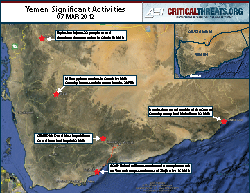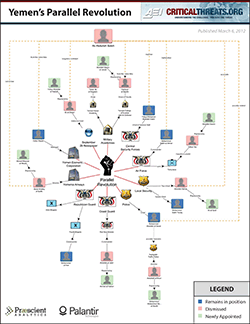 |
The spike in al Qaeda in the Arabian Peninsula (AQAP) activity after the presidential election indicates AQAP’s strength in Yemen, which has been increased through the activities of the AQAP-linked militant organization, Ansar al Sharia. A coordinated attack on a Yemeni army base in Abyan this weekend proves the intent to defend the stronghold gained last year.
Al Qaeda in the Arabian Peninsula conducted a series of attacks on Yemeni military and government targets. A suicide car bomb Saturday exploded outside the Dar al Nasr Republican Guard camp in al Bayda city and, the same day, bombs exploded outside of the Central Security camp in al Mukalla in Hadramawt governorate. Finally, AQAP-linked militants detonated a car bomb outside of a Yemeni army base in al Kod, which was followed by an attack by the militants. Fighting killed a reported 185 Yemeni soldiers in Zinjibar district in Abyan governorate Sunday and Monday. The militants seized heavy weapons, which they then turned on the Yemeni soldiers. At least 55 soldiers were captured and then paraded through the streets of Jaar, just north of Zinjibar city. AQAP released a statement on its recent military operations, including the weekend’s clashes. The statement also claimed responsibility for the downing of a military plane in Sana’a, reportedly used to transport supplies to the south.
Al Qaeda in the Arabian Peninsula claimed responsibility for the February 25 suicide car bombing at the presidential palace in al Mukalla in Hadramawt, which killed at least 21 Republican Guard troops and injured nine others. The February 29 statement confirmed the identity of the bomber as Saudi Mohammed al Sayari, who has roots in Hadramawt. AQAP rejected the transition of power to President Abdu Rabbu Mansour Hadi, saying that “America aims to steal the fruits of the revolution” and that “America’s project in Yemen will never succeed . . . our operations will reach the American project and its tools . . . wherever they are.” (Post obtained and translated by SITE.) The Yemeni Interior Ministry has issued a statement announcing that security forces were searching for three suspected car bombs in Sana’a on February 28.
President Hadi appointed a new commander of Yemen’s southern military zone, Salem Ali Qatan. Qatan will also command the 31st armored brigade. The former commander of the southern military zone, General Mehdi Makwala, was appointed Deputy Chief of General Staff for Manpower; however, it is unclear whether General Makwala will accept this position. He is from the same tribe and village as former President Ali Abdullah Saleh, was commander of the southern military zone and swore his allegiance to Saleh when General Ali Mohsen al Ahmar defected in March 2011. Hadi also appointed a new governor of Aden, Waheed Ali Rashid.
 |
The Yemeni Cabinet met on February 28 to discuss the ongoing strikes at public institutions across Yemen. A ministerial committee has been charged with submitting a proposal to address the underlying problems. Please read new analysis of Yemen’s Parallel Revolution by Sasha Gordon.
An explosion at an anti-American protest injured at least 22 people Friday. Abdul Malik al Houthi, the leader of the al Houthi movement, reported that the blast occurred in Sa’ada, but did not indicate who carried out the attack.
Note: The death toll from the attack in Zinjibar has been revised to 110 Yemeni soldiers.
← Previous |
Next → |
